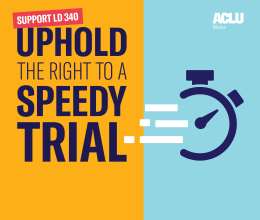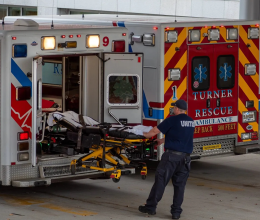This story updated 1/29/2020 to reflect that possession of 11 or more hypodermic needles is a Class D crime.
Augusta – Following news that drug overdose deaths in Maine increased in 2019, the ACLU of Maine renewed its call for the legislature to pass a bill that would stop the criminalization of people who use drugs and remove barriers to treatment and harm-reduction measures.
“Maine’s lawmakers keep saying ‘we can’t arrest our way out of this problem.’ Well, it’s time to take that claim seriously and actually stop criminalizing people who use drugs,” said Meagan Sway, policy counsel at the ACLU of Maine. “Maine needs a new way forward that looks beyond the criminal legal system as the solution to the overdose crisis. LD 1492 would help ensure people who use drugs don’t lose access to housing, employment and other critical supports that are essential to their health and well-being.”
According to figures released by the Maine Attorney General and Chief Medical Examiner today, 277 deaths were caused by drugs from January through September 2019, and total deaths for the year were forecast to be 4 percent higher than in 2018.
LD 1492, sponsored by Rep. Pinny Beebe-Center of Rockland, would reduce Maine’s use of criminal charges to punish people who use drugs. Criminal convictions follow people for the rest of their lives, punish them indefinitely, and stand in the way of their well-being and recovery. The bill, which was carried over from last session, ends some felony charges for possessing small amounts of a drug just because a person has prior drug convictions; ends criminal charges for possessing and exchanging hypodermic needles; raises the threshold amount for automatically charging someone with felony possession; requires an intent to traffick for felony trafficking charges; and removes criminal penalties for low-level drug possession.
Even as Maine’s leaders point to the need for a new approach, Maine continues to arrest more people on drug charges. According to a recent report from the Center for State Governments, overall drug arrests in Maine rose 2.8 percent over the last decade, and felony drug charges increased significantly – Class A drug charges went up 157 percent.
Maine’s thresholds for charging people with felony possession and felony trafficking are incredibly low compared to most other states. Possession of just two grams of heroin, an amount many people use in one day, is automatically defined by law as trafficking – even if the individual has no intent to sell the drug – and carries up to a 10-year prison sentence. By comparison, the threshold in Florida, Georgia, North Carolina and South Carolina is twice that; in Missouri it is 15 times higher. Most states don’t have automatic felony trafficking charges based on weight alone; rather, they require a showing that the individual intended to traffick.
Moreover, possession of 11 or more hypodermic needles is a Class D crime in Maine. When needles are criminalized, users are more likely to re-use or share dirty needles, which can lead to the spread of HIV/AIDS, Hepatitis C, and other blood-borne disease. Maine has one of the highest rates of acute Hepatitis C throughout the nation.
“Many in the law enforcement community claim that our drug laws are focused on catching people who get rich selling drugs, but that’s simply not the case. Maine’s drug laws are so out of touch that people are being charged as felony drug traffickers for possessing less than the amount of drugs they use in a day. Locking heavy users up isn’t fixing this problem, it’s making it worse,” said Sway. “When we insist on using the criminal justice system to address drug use, it tears families and communities apart, and people all around us keep dying. We have got to take the resources we spend putting people in jail, and reinvest them in making treatment, housing and other supports more available.”








